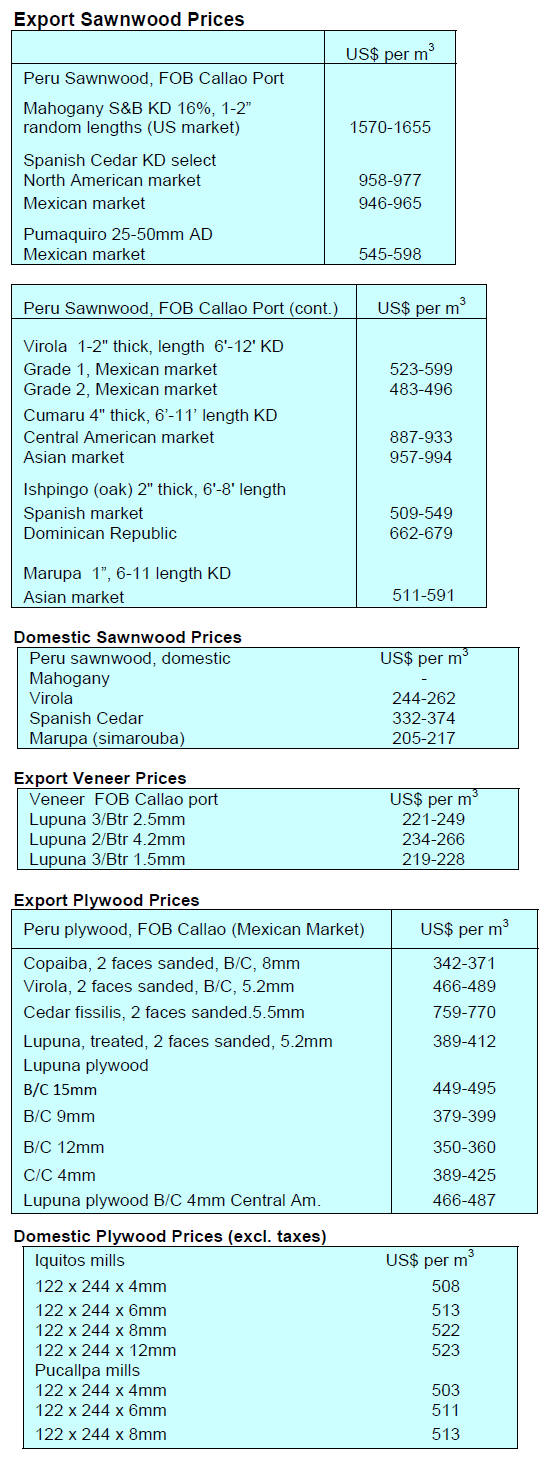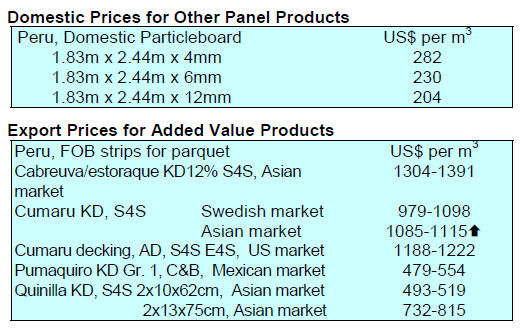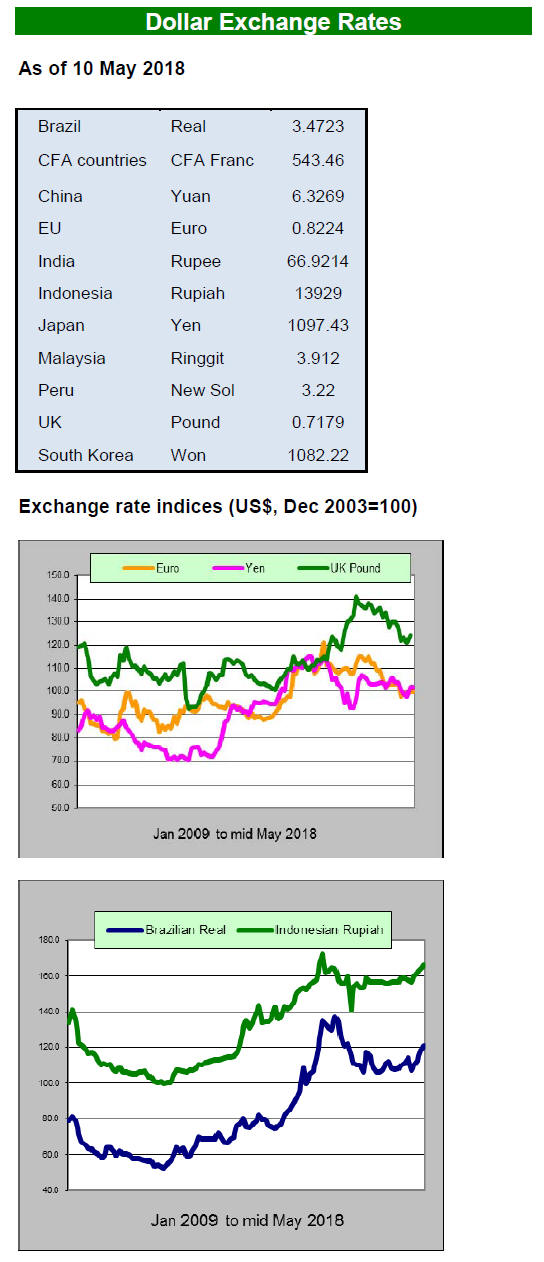2. GHANA
Export show positive growth
Ghana’s exports of wood products in the first 2-months of
this year totalled 57,539 cu.m compared to 56,501 cu.m
for the same period in 2017. The products that contributed
significantly to the year-on-year increase in trade were as
follows: rotary veneer +19%, dowels +16%, billets +12%,
kiln dry sawnwood +6%, air dry sawnwood +6% and
sliced veneer, +3%.
Of the products exported, sawnwood and billets accounted
for most of the export volumes (+80%). Teak, rosewood,
wawa, ceiba and papao were the dominant species traded
and these were shipped to the India, China, Germany
Vietnam and Belgian markets.
AGI calls for stimulus package for industries
The Association of Ghana Industries (AGI) has appealed
to government for a stimulus package that will allow local
industries to improve export competiveness. The AGI sees
good opportunities for local industries with the signing of
the Economic Partnership Agreement (EPA) on trade with
the EU as well as the African Continental Free Trade
Agreement which will boost trade between African
countries.
In a recent statement signed by its newly elected president
Dr. Yaw Adu Gyamfi, the AGI said “considering the
impact of these agreements on Ghana's revenue prospects
it is expedient for government to give local industries the
needed stimulus package support such as in order to give
meaning to these trade agreements that usher Ghana into
these regimes”.
According to Dr. Adu Gyamfi, manufacturing is a
cornerstone of the economy and urged government to
move quickly to implement the ‘One District One Factory’
policy since this will benefit manufacturers.
Sourcing raw materials from Liberia
In late April the domestic press reported that Anthony
Partey Asare, Director of Communications for the
Domestic Lumber Traders Association of Ghana, said his
Association is looking at the possibility of importing raw
materials from Liberia to address the problem of domestic
timber supplies.
The Association had approached the government
appealing for a waiver import duties. Analysts write, “my
understanding is that this proposal has been discussed at
government levels but the big issue is consideration of
duty waivers on import duties and this has become a
stumbling block”.
Ghana delegation attends UN Forum on Forests
A six-man Ghanaian delegation led by the Minister of
Lands and Natural Resources, Mr. John Peter Amewu,
attended the 13th Session of the United Nations (UN)
Forum on Forests, in New York.
The Minister delivered a keynote address on the Voluntary
Partnership Agreement (VPA) processes in Ghana. The
delegation also be discussed the country’s contribution to
the UN Strategic Plan for Forests (2017-2030).

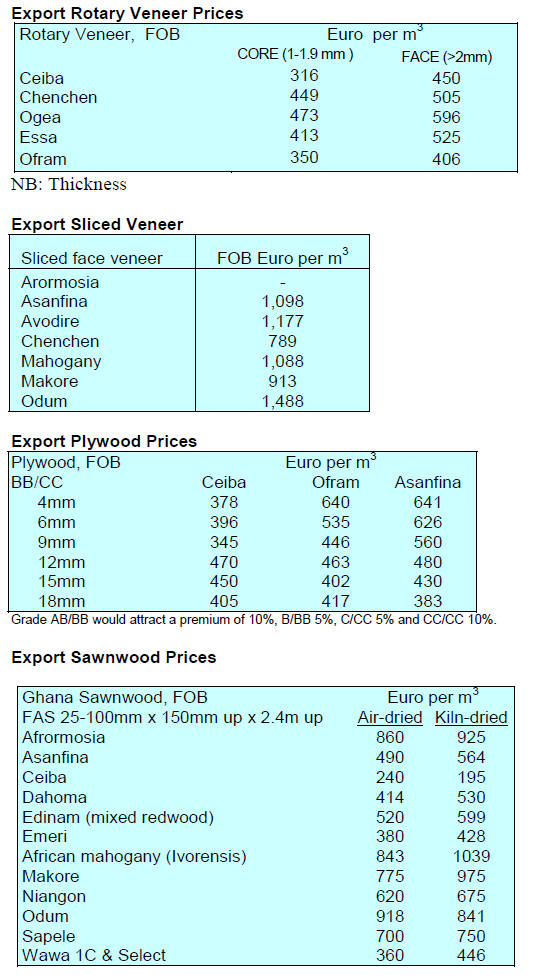
3.
MALAYSIA
Ministries being reorganised
On 9 May Malaysian elected a new government replacing
the party that had ruled Malaysia for around 60 years. The
government is now in the hands of Pakatan Harapan
(Alliance of Hope).
The head of the now ruling coalition, Dr. Mahathir
Mohamad, has said the government will be serviced by a
small Cabinet initially comprising 10 key ministerial
positions: finance, home affairs, defense, education, rural
development, economy and international trade, public
works, multimedia, science and technology and foreign
affairs.
There is no news yet on under what ministries forestry and
the timber industries will fall.
State takes control of Sabah Forest Industries
The Sabah State government has announced it will take
control of the failed India-owned pulp and paper mill,
Sabah Forest Industries (SFI), in Sipitang. This will secure
the jobs for the approx. 1,500 workers at the plant. The
State Government had been searching for a suitable buyer
for SFI but to no avail.
SFI is one of Malaysia’s largest plantation owners and
processors. The forest estate extends over 25,000 hectares
and processing capacity includes pulp and paper
manufacturing facilities, a sawmill, veneer mill and
plywood factory.
Valuing forest concession in Sabah
Valuation of forests in tropical countries always generates
considerable interest and the recent valuation of a forest
concession in Sabah is no exception. A Forest
Management Unit 5 (FMU5) timber concession in Sabah
extending over 88,920 hectares, for which Priceworth
International is proposing to pay RM260 million, has been
independently valued at RM433.8 million, significantly
higher the earlier valued.
The company is seeking shareholder approval for the
purchase of the concession rights for FMU5 which has 79
years remaining on the 100-year licence to manage, extract
and sell timber from the area.
Priceworth said the proposed acquisition of FMU5 would
cement its position as the leading integrated timber player
in Sabah with both upstream and downstream assets.
Malaysian young designers in India
The Sarawak Timber Industry Development Corporation’s
(STIDC) ‘Pool of Young Designers’ was recently in
Mumbai participating in the 30th INDEX India, an
international interiors, architecture and design event.
The aim of the visit was to explore opportunities in the
Indian market. The young team brought with them their
exclusive designs and innovative products for display.
STIDC’s participation in INDEX Mumbai is part of its
promotional programme to commercialise new designs
developed under the designers programme.
April plywood prices
Plywood traders based in Sarawak reported the following
export prices:
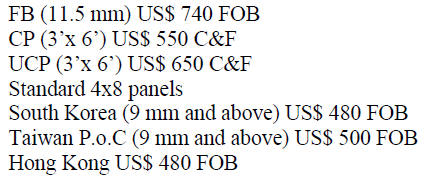
4.
INDONESIA
Indonesian enterprises
invited to Laos
Wishnu Krisnamurthi, Head of Economic Division of the
Indonesian embassy in Laos has said that Laos offers
many opportunities for Indonesian businessmen, including
those in the wood processing sector. He said there are even
opportunities to import roundwood from Laos.
According to the domestic press in Indonesia the Secretary
General of the Indonesian Furniture and Handicraft
Industry Association (HIMKI) will visit Laos to gain a
firsthand appreciation of opportunities. The government in
Laos is trying to attract inward investment and offers
generous support to investors.
Recently a representative of the Laos Furniture
Association was in Indonesia to court Indonesian firms.
During the visit the head of the Lao delegation signed a
MOU with the HIMKI under which Indonesian companies
will help with the development of timber processing.
In August 2015 and May 2016 regulations the Lao
government prohibited the export of logs and “lightly
processed sawnwood”. This had an immediate impact on
timber exports particularly those to China.
For more see:
https://www.forest-trends.org/publications/impacts-of-thelaos-
log-and-sawnwood-export-bans/
Plantation log production set to rise
The debate on the availability of plantation logs continues.
Indroyono Soesilo, Chairman of the Association of
Indonesian Forest Concessionaires (APHI) has said that
despite the recent decline in log production, 2018
production should improve.
He said that while national plantation round wood
production in the first quarter of this year was some
330,000 cu.m below that of last year due to adverse
weather conditions, prospects for the rest of the year look
promising as the dry season should result in an increase in
harvesting.
Restoration of peatlands helps in reducing incidence
of fire damage
The Ministry of Environment and Forestry has reported a
significant decline in the number and extent of forest fires
over the past three years. One reason behind the decline is
the efforts on restoration of peatlands.
Bambang Hendroyono, Secretary General in the Ministry
said that in 2015 some 2.6 million hectares of forest
suffered damage, the worst ever recorded. With the
establishment of the Peatland Restoration Agency (BRG)
things improved.
The BRG has accelerated the pace of peatland recovery
and restored the hydrological function of damaged
peatlands.
In 2016 the extent of fire damage covered 400,000 ha. and
this dropped to 160,000 ha. in 2017. Bambang said close
cooperation between central and regional agencies and
local stakeholders was important in achieving success.
Singapore companies biggest investors
Total direct investment (foreign plus domestic investment)
in Indonesia rose 11.8 percent year-on-year (y/y) to IDR
185.3 trillion in the first quarter of 2018 raising
expectations that the 2018 direct investment target of
Rupiah 765 trillion can be achieved.
The biggest foreign investor was Singapore with around
US$ $2.6 billion originating from this single source. Many
Singaporean companies that invest in Indonesia have
Chinese or Indian parent companies. The second ranked
investor was Japan at US$1.4 billion, followed by South
Korea, China and Hong Kong.
See:
https://www.indonesia-investments.com/news/todaysheadlines/
foreign-direct-investment-in-indonesia-rose-12.4-inq1-
2018/item8769
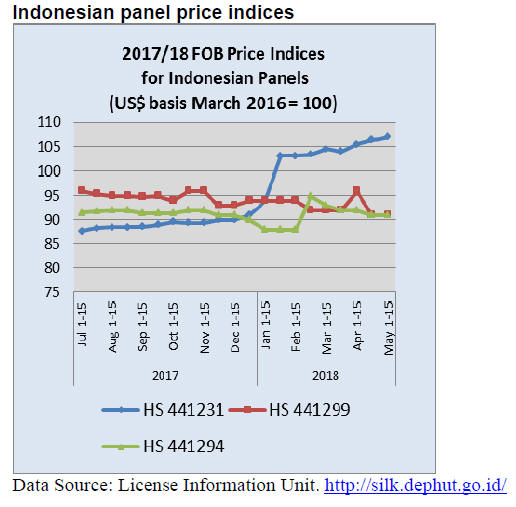
5.
MYANMAR
Investment in plantations required before
approvals
for processing
It has been reported that the Myanmar Investment
Commission is requiring foreign investors in wood
processing to first establish plantations to ensure raw
material supply.
This has been strongly criticised because it will deter
potential investors because of the time it takes for
plantations to yield industrial sized logs and because the
nature of the plantation business and wood processing
require very different skills and level of investment.
In related news, the Forest Department has announced that
it has repossessed title over 135,000 acres of plantations
because contractual terms have not been met.
Media reports say some 63,000 acres of teak plantations
and 72,000 acres of other hardwood plantations have been
repossessed. In another instance around 140,000 acres has
been repossessed by the Tanintharyi Regional Government
because of contract non-compliance by investors who
intended to establish palm plantations.
Analysts write that under the previous administration in
Myanmar many influential people acquired land for forest
plantation and other uses.
The timber industries in Myanmar have to deal with
uncertainty of raw material supplies, especially teak. The
Forest Department has announced the conditions under
which harvests of teak logs from government owned
plantations will be allowed.
There are two conditions, say analysts, minimum age 30
years and minimum girth 3 feet.
MTE dollar and Kyat log sale system could create
problems for CoC
One exporter, who prefers to remain anonymous recently
said that the Myanma Timber Enterprise (MTE) should
consider simplifying the system for the sale of teak logs.
The MTE is currently selling through two systems, one is
sales in US dollars which allows buyers to process for
export, the other system is timber sales in local currency
but in this case the products cannot be exported.
Barber Cho of the Myanmar Forest Certification
Committee has said that, in terms of chain of custody,
having two systems one of which allows exports could
create problems of verifying legality as it would require
the separation of logs and products (US$ purchase or local
currency purchase) throughout the supply chain.
As the independent certification bodies in Myanmar will
soon start inspections for the issuance of Legality
Compliance Certificates this matter should be addressed.
State owned enterprises have heavy financial
obligation to governmemt
According to an interview given to the Myanmar Times,
MTE Deputy General Manager, U Khin Maung Kyi, said
the MTE is targeting sales of 5,000 tonnes of teak and
100,000 tonnes of other hardwoods in the first half of
fiscal 2018. This could generate Kyat 63 billion.
The MTE, as a state owned enterprise, is apparently
required to contribute some of its revenue to the central
government as well as pay corporate taxes. According to a
statement by Daw Nwe Nwe Win, Director General from
Budget Department, state-owned enterprises must
contribute 20% of their revenues to the State as well as
pay a 25% tax on net income.
6. INDIA
Trade in some dalbergia species
resumes
As a result of active intervention by the Indian Ministry of
Commerce and the Forest Department a resumption of
trade in of some dalbergia species has become possible.
CITES notification No. 2018/031 dated 26 March 2018
details the extent of the changes agreed. The following is
the text of the CITES notification which can be found at:
https://www.cites.org/sites/default/files/notif/E-Notif-2018-
031.pdf
1. The Management Authority of India has informed the
Secretariat that the Government of India has banned the
export for commercial purposes of all wild-taken
specimens of species included in Appendices I, II and III,
subject to paragraph 2 below.
2. India permits the export of cultivated varieties of plant
species included in Appendices I and II and has indicated
that all products, other than the wood and wood products
in the form of logs, timber, stumps, roots, bark, chips,
powder, flakes, dust and charcoal, produced from wild
sourced (W) Dalbergia sissoo and Dalbergia latifolia and
authorized for export by a CITES Comparable Certificate
issued by the competent authorities of India are exempted
from the general ban.
Such Dalbergia sissoo and Dalbergia latifolia specimens
are harvested legally as per the regional and national laws
of India and as per the prescribed management (working)
plans, which are based on silvicultural principles and all
are covered under Legal Procurement Certificate; all the
material are sold from the Government timber depots
through auction or are legally procured and can be
exported legally.
3. Starting on the date of this Notification, all the CITES
Comparable Certificates will be issued with a footnote,
stating that the wild (W) source specimens are covered
under Legal Procurement Certificate as per regional and
national laws in India.
4. Parties are urged to inform the Indian Management
Authority and the Secretariat of any attempted violations.
5. This Notification replaces Notification to the Parties
No. 1999/39 of 31 May 1999.
Analysts say that exporters are buying the logs legally
from various Forest Departments and that they are
delighted to see a resumption of trade.
One positive result of the dalbergia ban has been growing
market acceptance of Terminalia tomentosa (Indian laurel)
for musical instrument manufacture.
As a follow-up to the easing of restrictions on domestic
dalbergia, the local industry has requested government
inventory all dalbergia standing trees across the country to
make show that India has an abundance of this species and
there is no risk of extinction. It seems that a survey will be
conducted through the Botanical Survey of India.
Seized Sandalwood to be auctioned
The Maharashtra Thane forest authority will be auctioning
80.46 tonnes red sanders in a 24-hour auction between 16-
17 May, 2018. Prospective buyers have until 15 May to
inspect the logs.
More details can be found at:
www.mstcecommerce.com.
This is the first time Maharashtra will be auctioning wood
from the protected species. Over the past 10 years some
600 tonnes of illegaly harvest red sanders has been seized.
This highly valued timber has a ready international market
in China, Japan, the Middle East, Sri Lanka, Bhutan and
Nepal.
Builders ‘think small’ to target buyers on a budget
For Indian home buyers affordability is key and at last
builders are adjusing the size of homes to make them more
acceptable. Real estate companies are desperate to attract
buyers the inventory of unsold homes is enourmous
because of the long period of slow sales.
‘Space efficiency’ (read smaller) 2 and 1.5 bedroom,
affordable, homes are in demand and one major company
nows offers a one bedroom-hall-kitchen property for first
time buyers.
Because of demonetisation and other regulatory changes
property prices have begun to drop and adjusting home
sizes will bring in more buyers according to local
commentators.
Plantation teak prices
Demand for imported logs continues unchanged but the
volumes imported are still well below levels prior to the
date when banks cut the credit limits for importers, a
response by the banks to the banking scandal in the
country. Without adequate working importers are
struggling to finance imports.
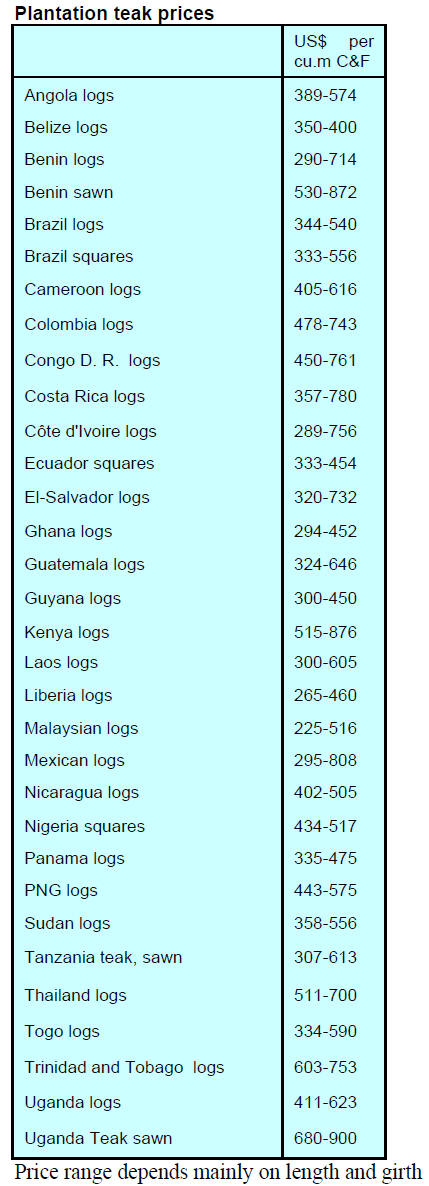
Locally sawn hardwood prices
Prices for domestically milled imported hardwoods
continue unchanged.
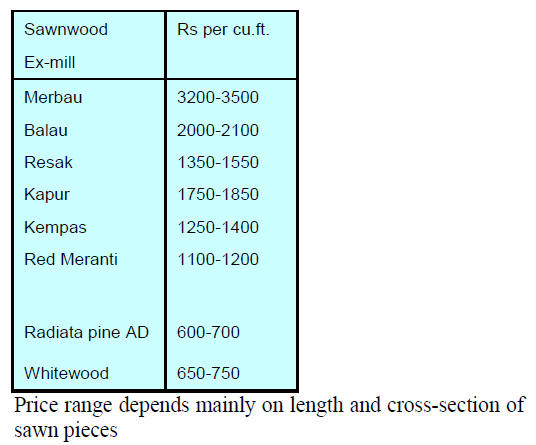
Imported sawn Myanmar teak
The consensus in trade circles is that more and more
endusers are moving away from using Myanmar teak as
they find cheaper alternate species good enough.
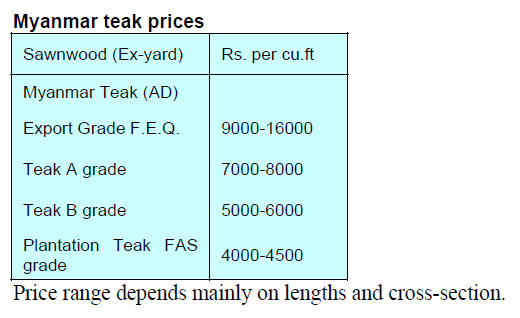
Prices for imported sawnwood
Prices for imported sawnwood (KD 12%) ex-warehouse
remain unchanged.
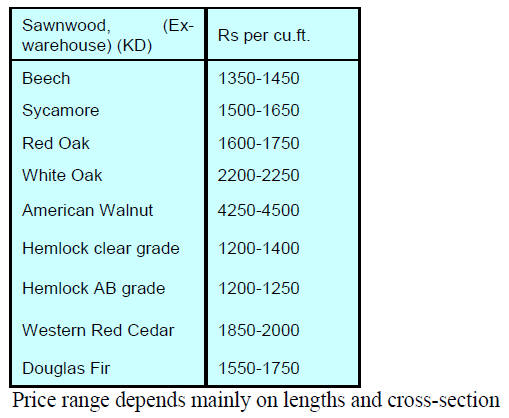
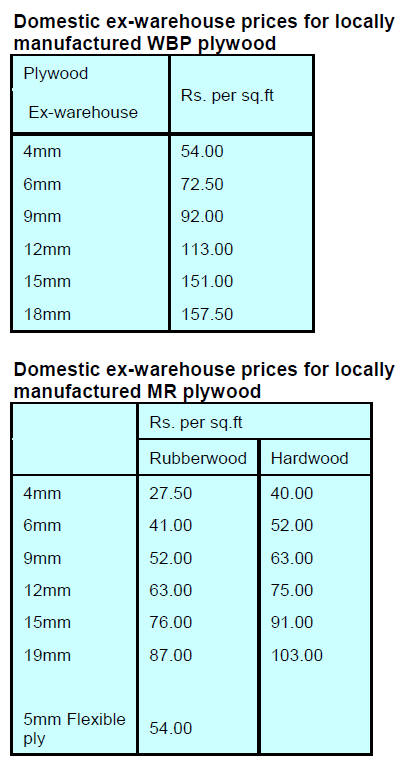
Greenply rebrands as Greenpanel
Greenply Industries Limited (GIL) has rebranded its MDF,
wood floors, plywood, veneers and doors as Greenpanel.
This was announced to coincide with coming on-line of its
board production facility at Chittoor, Andhra Pradesh
which, the company says, is set to be the largest MDF
plant in Asia.
Greenply has a substantial share of the Indian ‘organised’
plywood market and a 30% share of the domestic MDF
market.
7. BRAZIL
Deadline for SINAFLOR implementation
pushed
forward
The Brazilian Institute for the Environment and
Renewable Natural Resources (IBAMA) has extended, to
December 31, 2018, the deadline for the implementation
of the National Forest Products Control System. This was
slated to come into force 2 May 2018.
The IBAMA regulation 14/2018 establishes transition
rules for authorisation of forestry activities submitted
under the National Environmental System (SISNAMA).
Requests for authorisation of forestry activities filed with
SISNAMA agencies before 2 May can be registered
through the Forest Logging Authorisation (Autorização de
Exploração Florestal - AUTEX) which is part of the
Document of Forest Origin (DOF) system and will stay in
place until the 31 December deadline.
The December deadline also applies to applications for
revalidation, extension of validity or other procedures
related to logging permits previously registered in the
DOF system provided that they are submitted to the
environmental agency before May.
SINAFLOR is designed to integrate the various IBAMA
control mechanisms such as the Forest Origin Document
(DOF) and the Annual Operational Plan (POA) as well as
the Rural Environmental Registry National System
(SICAR).
One of its objectives is to improve the control of the origin
of wood products tracking the steps from authorisation of
harvesting exploration through transport, storage,
processing and sale. The system aims to increase the
degree of security and reliability of the systems as a
whole.
Furniture production recovering
In the first three months of this year the furniture industry
recorded an increase of 8.9% in production and in the 12
months up to March 2018 there was an almost 9% rise.
According to the Brazilian Institute of Geography and
Statistics (IBGE), compared to a month earlier domestic
furniture sales in March fell slightly although year on year
March sales were up. Analysis by IBGE suggests that
domestic sales in 2018 will be better than 2017 but that
month on month volatility can be expected.
The private sector confirmed the slight drop saying March
output declined 2.5% compared to February but increased
7% when compared to production in March last year. The
weak retail furniture sales reflect consumer uncertainties
with the economy and politics in the country.
Woodbased panel exports increase
The value of woodbased panel exports in the first quarter
of 2018 totalled US$73 million a 14% rise compared to
the same period last year.
Between January and March of this year the main markets
for woodbased panels were Latin America (up 11% to
US$39 million) and North America (up 21% to US$17
million). In terms of volume, woodbased panel exports
totalled 308,000 cubic metres in the first quarter of this
year an increase of 8.5% compared to the same period in
2017. In the domestic market, 1.6 million cubic metres
were sold, an increase of 3%.
Cooperation agreement with Chinese association
The Brazilian Association of Mechanically Processed
Wood Industry (ABIMCI), comprising manufacturers of
wood products such as plywood, sawnwood, frames,
doors, among others has signed a cooperation agreement
with the China Timber and Wood Products Association
(CTWPDA) which has over 3,000 members in China.
The goal is to foster closer business ties between the two
associations, facilitate access to information between the
two Associations and identify trade opportunities between
China and Brazil.
According to ABIMCI, Brazil has a real potential for
growth in exports and can verify the legal origin of its
wood products. Currently, almost 70% of planted forests
in Brazil are certified. In 2017, Brazil exported more than
63,000 cubic metres of tropical timber and 328,000 cubic
metres of pine sawnwood to China.
The spokesperson for the CTWPDA highlighted the
quality of Brazilian wood products and stressed that it is
necessary for the Association members to understand the
opportunities in Brazil as they work to satisfy Chinese
domestic demand.
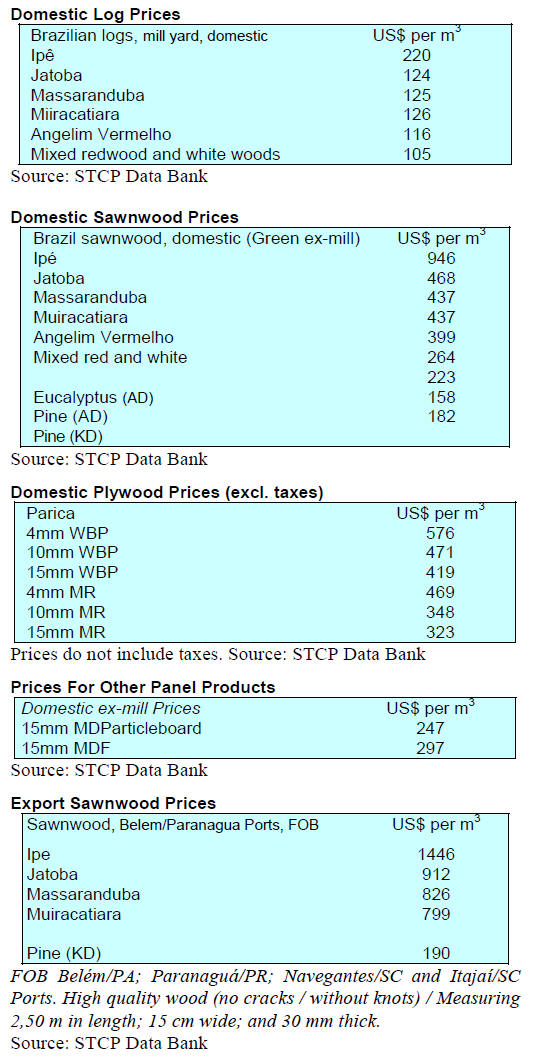
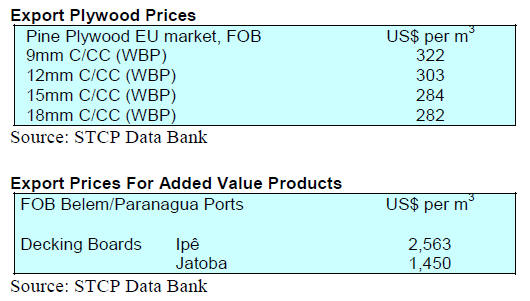
8. PERU
Local enterprises
disadvantaged when it comes to
financing plantations
A former minister has commented that private forestry
sector operatives face two major challenges; a complicated
legal framework for forest plantations and securing
financing for plantation development.
Domestic financing sources for plantations are limited,
difficult to access and attract high interest rates. Plantation
forestry depends on long-term financing and a lender that
understands that returns on investment can only be made
when the trees are ready for harvest which could be as
long as 20-30 years depending on the species.
Executive Committee for Forestry Development should
be strengthened - ADEX
Erik Fischer, Vice President of the Peruvian Association
of Exporters (Adex) has noted that the full potential of the
country’s Executive Committee on Forest Development is
yet to be achieved.
The Executive Committee is charged with initiating
economic development in the sector.
"The Executive should be strengthened and logistical,
technical, administrative and budgetary support should be
provided to accelerate progress through removing the
hurdles facing the private sector as it moves to expand the
productive sectors and take the country forward", said
Fischer.
Specifically, Fischer pointed out that the trade balance for
the forestry sector in 2017 was in deficit with imports
exceeding the US$315 million while exports were only
US$121 million,.
Fischer called on the national authorities to recognise the
enormous value of the Peruvian forests but one that
contributes the least to the Peruvian economy.
In related news, Drago Bozovich, CEO of Maderera
Bozovich, one of the largest exporters of Peruvian timber,
has commented on the growing interest of foreign
companies in the purchasing local forestry sector
enterprises.
